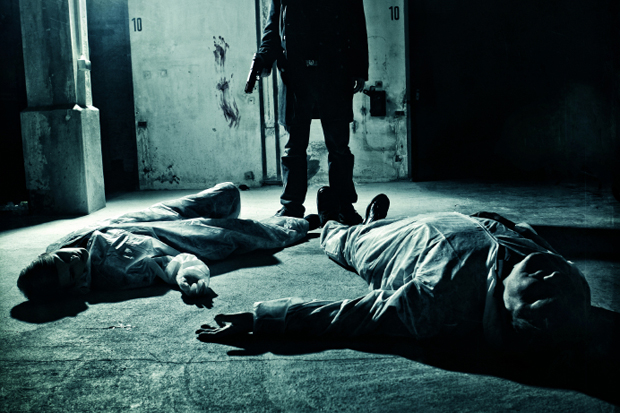Gabriel Tallent’s My Absolute Darling (4th Estate, £12.99) has the word masterpiece emblazoned on the cover, alongside quotes from several famous authors telling us how brilliant it is. It can be difficult to see through this hype and find the true novel, but let’s try.
Fourteen-year-old Turtle Alveston lives with her father, Martin, a survivalist type who’s taught her how to fire a gun and use a hunting knife from an early age. He abuses his daughter, trapping her in a circle of love and pain. When Martin brings home another young girl, Turtle at last finds the courage to confront the man who has so dominated and controlled her life.
This is a bloodstained book, etched with violence, with unflinching depictions of abusive sex and desperate love. Yet from beginning to end the writing is overloaded with beauty. I don’t think I’ve ever read a book so in love with its own virtuosity as this. It’s a double-edged sword: the brilliance holds the book back from that final true depiction of life. A novel needs flaws, wounds of its own, that correspond to the characters’ flaws: cracks to let in a little light. But this is an amazing debut: it will be fascinating to see where Tallent goes next.
In Prague Nights (Viking, £14.99) Benjamin Black turns his hand to the historical thriller. In 1599 a young doctor called Christian Stern arrives in Prague, hoping to make his fortune. Instead, he discovers the body of a young woman, her throat slit. The victim is none other than the Emperor’s mistress. Stern is employed to find the killer’s identity, a task that takes him deep into the corrupt and shadowy world of the court, where the black arts of the English magician John Dee hold as much sway as diplomacy and torture. When Stern becomes a lover of the Emperor’s wife, his own life is endangered.
Benjamin Black is the pseudonym of the Booker prize-winning author John Banville. Under both names he writes with precision and poise. The best historical thrillers move at two different tempos: the slow revelling in detail and the page-turning thrills of a murder mystery. Prague Nights certainly works on the historical level, while the crime aspects are taken perhaps at too steady a pace really to hold our attention. The Kafka-in-waiting aspects work best: the labyrinthine nature of court life and the endless intrigues that lead to dead ends.
In Codename Villanelle (John Murray, £14.99) Luke Jennings pits a heartless female assassin against a dowdy but dogged MI5 agent called Eve Polastri. The two battle it out at a distance, one following a few steps behind the other, seeking clues at a series of killing sites. It reads a little like Terry Hayes’s I Am Pilgrim in miniature. The shortness of the book suits the coldness of Villanelle, but not the temperament of Polastri, who needs more time and space to become interesting. Jennings pays closer attention to the process of hunting and killing than he does to character building.
The final pages are thrilling, but then the book ends and nothing has been resolved, or indeed solved. Only now do we find out that this is the first part of a serial, originally published as an ebook single. It’s frustrating. The novel will be a BBC drama series, and this feels like the prose version of season one. I wish I’d been given the whole story in one giant book: I Am Pilgrim proved that people are willing to read 800-plus pages of detailed cat-and-mouse games between killer and secret agent. This feels like short measure.
As it happens, the shortest book on offer holds the most intrigue. Pascal Garnier’s Low Heights (Gallic Books, £8.99) continues his run of mordant, black-humoured, murderous farces to superb effect. After suffering a stroke, Édouard Lavenant, a cantankerous widower, employs a much put-upon nurse, Thérèse, who struggles daily with his ailing body and his devastating ill-humour. The arrival of a young man claiming to be Lavenant’s son sets in place a series of events that leads to ever more horrific acts. Garnier balances cruel jokes with startling poetic images that catch the reader unawares.
There is no learning in this novel, no explaining of the urge to kill, none of the methods by which we currently account for human endeavour: instead, the acts of violence happen in the moment, without proper forethought, the outcome of a sudden desire that takes us over. It rings true. And in this novel, the ending is also unresolved: not because season two has to be sold as a separate package, but because the words grow and die and grow again naturally out of life, that beautifully unfinished story.
Got something to add? Join the discussion and comment below.
Get 10 issues for just $10
Subscribe to The Spectator Australia today for the next 10 magazine issues, plus full online access, for just $10.
You might disagree with half of it, but you’ll enjoy reading all of it. Try your first month for free, then just $2 a week for the remainder of your first year.














Comments
Don't miss out
Join the conversation with other Spectator Australia readers. Subscribe to leave a comment.
SUBSCRIBEAlready a subscriber? Log in